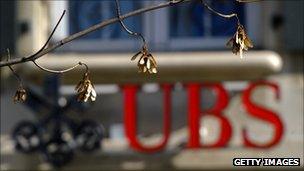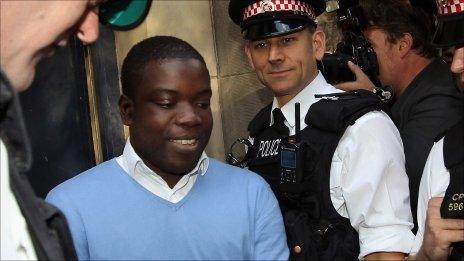The how but not why of UBS's losing bets
- Published
- comments

UBS say the size of the bets was hidden by fictitious offsetting investments
Hello from balmy China, where I am making a two-part documentary on the 15 years leading up to our current economic malaise and the next 15 years.
(When I say "our", in this context I mean the heavily indebted, slow-growing developed economies of the west).
As luck would have it, UBS's synopsis of how it incurred a $2.3bn (£1.5bn) loss from unauthorised transactions by an alleged rogue trader, Kweku Adoboli, landed in my inbox just as my aeroplane to Shanghai took off.
So here are a few thoughts from the plane, whose communication to you is all due to the refusal of cabin staff to let us sleep (I bet you're pleased).
First, I am not surprised that the size of the loss has turned out to be 15% greater than UBS first estimated - because selling or hedging big trading positions in a hurry, as UBS had to do on Friday, is always expensive.
Second, what UBS has provided is useful detail about the mechanics of the transactions - and why it failed to identify them till it was too late to avoid a colossal loss - but important questions remain unanswered.
For the past three months, big bets were placed on future movements in stock-market indices, the S&P 500, the Dax and the EuroStoxx. This was speculation on the future direction of share prices.
According to UBS, the size of the bets was hidden by the manufacture of fictitious offsetting investments via financial products called Exchange Traded Funds.
To put it another way, the impression was created that UBS was taking no more risk than usual, when in reality it was taking huge risks on stock-market bets.
So from mid June to last Wednesday, UBS's risk-control systems did not detect that these big bets were being placed, because its internal accounting system was showing that bets in the opposite direction had also been placed.
Think of it as the equivalent of a bookmaker placing bets with his firm's cash, and only pretending to lay off those bets with other bookmakers - which would be financial suicide if the real bets were not to come good.
So we have a slightly better idea of how the bets were taken and how UBS missed them. But it doesn't explain why the bets were taken.
Rational motive
Here's the thing: if the bets had been winning bets, rather than losing ones, surely at that point UBS's internal controls would have detected that the bank had made winnings considerably bigger than it should have done, in that the winnings should have been reduced by losses from the offsetting bets but would not have been (keep up).
In other words, the existence of big winnings would surely have set alarm bells ringing that the offsetting nets were fictitious.
Which means that it is very difficult to detect a rational motive for the taking of real bets matched by offsetting fictional ones, because it is very difficult to see how any individual could have profited by such a stratagem.
For example, by the time bonuses were being decided, surely the fictitious transactions would have come to light.
Unless, that is, there is never any moment at huge banks like UBS when book profit is reconciled with cash profit - so that all profit is only what is shown by the internal accounting system, even if some of the entries in that accounting system are fictional.
Anyway, it is all very intriguing - and shows that UBS has a good deal of work to do, to prove that its risk monitoring systems are adequate.
- Published16 September 2011
